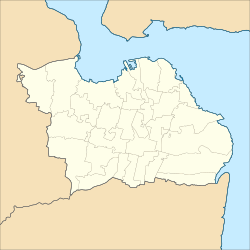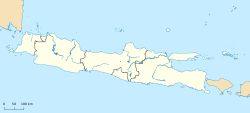Gelora 10 November Stadium
Appearance
7°15′06″S 112°45′22″E / 7.25157°S 112.755989°E
| Stadion Gelora 10 November | |
G10 November Stadium | |
 Gelora 10 November Stadium | |
| Former names | Tambaksari Field (until 1954) Tambaksari Stadium (1954–1969)[1] |
|---|---|
| Location | Tambaksari, Surabaya, East Java, Indonesia |
| Coordinates | 7°15′06″S 112°45′22″E / 7.25157°S 112.755989°E |
| Public transit | |
| Owner | Government of Surabaya |
| Capacity | 20,000 |
| Surface | grass |
| Construction | |
| Opened | Between 1907 and 1923 (Field) 11 September 1954[1] |
| Renovated | 1951–1954, 1969, 2018 |
| Architect | Tan Giok Tjiauw (stadium)[1] |
| Tenants | |
| Persebaya Surabaya (1952–2010) NIAC Mitra (1979–1990) | |
Gelora 10 November Stadium (Indonesian: Stadion Gelora 10 November; literally "10 November Sports Arena Stadium"), formerly known as Tambaksari Stadium, is a football stadium located in Tambaksari, Surabaya, East Java, Indonesia. It is currently used mostly for association football matches. Originally a football field named Tambaksari Field (Indonesian: Lapangan Tambaksari), the stadium holds 20,000 people.[2] The stadium is widely known to has Pterocarpus indicus trees inside.[1] The current name derives from the starting date of Battle of Surabaya, which later become the Indonesian Heroes' Day.
Major events
[edit]- 26 August – 6 September 1969: 7th Indonesian National Games (Indonesian: Pekan Olahraga Nasional)
- 16 June 1983: Post-season tour match of Arsenal, when they were beaten 2–0 by local club NIAC Mitra.
- 11 July 1992: Sepultura's Arise World Tour[1]
- 28 June – 6 July 2012: 4th ASEAN School Games
References
[edit]- ^ a b c d e Randy Wirayudha (19 October 2018). "Cerita dari Stadion Gelora 10 November Surabaya". Historia.id.
- ^ www.fussballtempel.net



